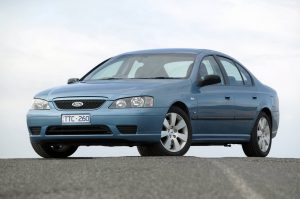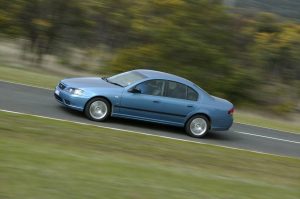Recalls: Ford BF Falcon
Overview
Manufacturers, or importers, issue recalls for defects or faults which have the potential to cause injury. Generally, manufacturers will inform the original buyers if their vehicle is subject to a recall and of the steps required to remedy the defect or fault. Please note that the recalls below (if any) are for Australian-delivered vehicles only. Furthermore, the number of recalls should not be taken as an indication of a model’s reliability or its safety more generally.
Recalls: Ford BF Falcon
2006-07 Ford BF Falcon E-Gas: undersized O-rings
In April 2007, a recall was issued for Ford BF Mk.II Falcon vehicles fitted with the ‘E-Gas’ dedicated LPG system/engine and manufactured from November 2006 to March 2007 (PRA 2007/9199). This recall, however, was subsequently extended to models manufactured up to 23 July 2007 (PRA 2007/9580, PRA 2007/9625). In these vehicles, the LPG tanks may have a service valve hand tap fitted with undersized O-rings. As a result, the service valve hand tap could fail, causing LPG to leak from the hand tap spindle and creating a potential fire or explosion hazard.
2007-08 Ford BF Falcon E-Gas: loss of braking assistance
In June 2009, a recall was issued for Ford BF Mk.II and Mk.III vehicles fitted with the ‘E-Gas’ dedicated LPG system/engine and manufactured from 16 January 2007 to 22 August 2008 (PRA 2009/10855); in February 2010, however, this recall was extended to vehicles manufactured from 20 October 2008 to 4 September 2009 (PRA 2010/11455).For these vehicles, the brake booster check valve may develop a vacuum leak at the check valve – this could result in reduced power assistance to the vehicle’s brakes.
2002-08 Ford BA/BF Falcon sunroof: separation of glass and frame
In February 2011, a recall was issued for Ford BA and BF models built from 8 May 2002 to 7 March 2008 and with a factory-fitted sunroof. In these vehicles, a bonding problem with the sunroof’s glass panel could result in separation from the frame and potentially dislodge while the vehicle was in motion (PRA 2011/12318).
Problems and faults: Ford BF Falcon
Overview
This section identifies potential problems, causes and fixes based on the experiences of owners and repairers, online sources and technical service bulletins. This information is provided solely for reference purposes and AustralianCar.Reviews recommends that only properly qualified persons carry out repairs or modifications. Furthermore, the number of items below should not be taken as an indicator of a model’s reliability or the frequency with which they may occur.
To report a problem or fault to the AustralianCar.Reviews team, please use the Contact Us form. Note that AustralianCar.Reviews does not offer advice on automotive problems or disputes; such enquiries will not receive a reply. For vehicles purchased from dealers after 1 January 2011, please see our Australian Consumer Law fact sheet.
BTR transmission
The four-speed BTR automatic transmission had a heat exchanger (or Remote Transmission Oil Cooler, RTOC) under the inlet manifold. However, the lines within the heat exchanger could deteriorate due to age, wear or corrosion, allowing coolant and transmission oil to mix. If this occurred, the fluid in the coolant reservoir would appear milky (hence the term ‘milkshake’) and damage to the transmission would require it to be rebuilt or replaced. To prevent contamination of the transmission fluid with coolant, a common modification was to fit an external air/oil cooler kit to bypass the heat exchanger.
ZF transmission
The six-speed ZF automatic transmissions used an external heat exchanger to cool the transmission. However, the lines within the heat exchanger could deteriorate over time, allowing coolant and transmission oil to mix. If this occurred, the fluid in the coolant reservoir would appear milky (hence the “ZF milkshake”) and, within the transmission, the friction linings would be pulled from their steel backings and the mechatronic control unit would be damaged. To fix, the transmission would have to be rebuilt and the mechatronic control unit replaced.
To prevent contamination of the transmission fluid with coolant, a common modification was to fit an external air/oil cooler kit to bypass the heat exchanger. In fitting these, however, it was important that the transmission fluid be filled to the correct level as the ZF transmission was sensitive to fluid levels and would enter ‘limp home’ mode if not within tolerances. Another modification was to replace the OEM heat exchanger and hoses/lines to the transmission with a more robust after-market product. Please note, however, that Ford Australia considered any modifications to the heat exchanger to void the warranty.
Engines
- Belt squeal and rattling noises from the engine bay may be due to a faulty accessory belt tensioner which requires replacement. If the tensioner fails, the accessory belt may snap, causing the power steering, alternator and water pump to stop working.
- The O-ring seal at the back of the water pump was susceptible to leaking.
- A rattling noise at idle may be due to a loose exhaust heat shield.
- The radiator was susceptible to leaking.
- Low idle, stall or variable idle: for Ford’s BA/BF vehicles, engine speed may drop below the normal idle speed – the engine may then either stall or the ECU may intervene to raise engine speed, causing a variable idle. Ford Australia issued a service bulletin (TSB 20/05) regarding this problem recommending that the throttle body be cleaned and the ECU re-flashed.
- Knocking noises from the engine bay which are loudest near the glovebox may be due to the vacuum hoses vibrating against the body or other components – this can be fixed with a cable-tie.
Rear brake hose service campaign
In May 2007, Ford Australia initiated a ‘service campaign’ to replace the rear brake hoses of 200,000 Ford BA/BF vehicles that were produced from September 2002 to March 2007. In these vehicles, the rear brake hoses were susceptible to excessive wear and could leak. At worst, however, the hoses could rupture. According to Ford, the driver would generally experience reduced braking effectiveness and a warning light would illuminate in the instrument cluster to warn the driver. As part of the service campaign, the brake hoses were replaced during regular servicing performed by Ford dealers.
Brakes
- Shuddering from the front wheels – which can be felt through the brake pedal – is indicative of warped brake discs.
- Squealing noises from the brakes may be due to brake pad glazing (i.e. the friction material overheats on the pad surface and disc). Brake pad glazing may also result in increased stopping distances, brake shudder and vibrations.
- The ABS light may illuminate intermittently due to problems with the ABS sensors – this may be fixed by cleaning or replacing the sensors.
Handbrake
For Ford BA/BF sedans, the handbrake shoe may not centre correctly when the handbrake is released due to the fixed end not holding the show in position – this may cause a ‘cyclic swish type noise’ from the driver’s side rear wheel when driving. Ford Australia issued a technical service bulletin (TSB 09/06) regarding this problem and developed a kit (BA2 2K068 AKIT) to fix whereby a revised park brake shoe centering spring would be fitted and the contact points lubricated.
Suspension
- Knocking noises from front suspension may be due to worn lower ball joints.
- Clunking noises from the rear of the vehicle – particularly at low speeds – may indicate that the differential bushes require replacement.
- Knocking noises from the rear suspension when driving over bumps may indicate that the upper shock bushes require replacement.
Problems and faults: Ford BF Falcon
- A malfunctioning body computer may turn on the interior lights and drain the battery; if so, the computer needs to be reset.
- Problems with the door locks are usually due to the actuators failing.
- Low battery voltage can make the gearshift indicators flash and the transmission enter ‘limp home’ mode, requiring the battery to be replaced.
- The combination switch for the headlights may only work in the ‘auto’ position or may stop working due to the wires for the manual and automatic operation snapping.
- The inner rear door handles were susceptible to falling off – securing the clips with Blu Tack may alleviate the problem.




